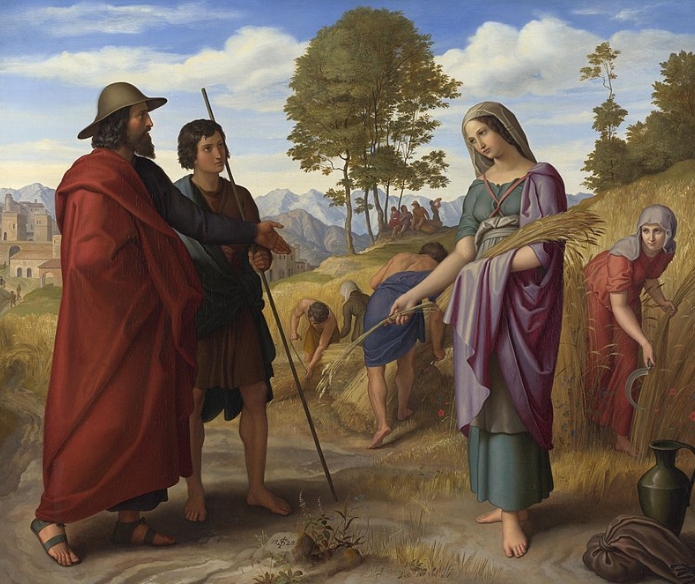Ruth and her experience of love
The third in our series focusing on four women this Advent looks at Ruth, who reminds us of a robust, relational, restless love, that endures for centuries and transforms in weeks. By Terry Young
 In his Seasons of Love – Rabbi Sacks on Shavuot, Jonathan Sacks notes how God’s special love saturates and drives the narrative of the book of Ruth. In English, we don’t have a good word for the original Hebrew, and our meaning for the name, Ruth – friendship – lacks passion. We get a better idea from its opposite – ruthless! There is a sharp and powerful description of what it means to be drained of all loyalty, compassion, care or feelings of relationship. There is an emotion to shape the world! Fortunately, the opposite of ruthless has even greater power.
In his Seasons of Love – Rabbi Sacks on Shavuot, Jonathan Sacks notes how God’s special love saturates and drives the narrative of the book of Ruth. In English, we don’t have a good word for the original Hebrew, and our meaning for the name, Ruth – friendship – lacks passion. We get a better idea from its opposite – ruthless! There is a sharp and powerful description of what it means to be drained of all loyalty, compassion, care or feelings of relationship. There is an emotion to shape the world! Fortunately, the opposite of ruthless has even greater power.
I spent time with Ruth this summer preparing for ministry in the autumn and greatly appreciated Kenneth C Way’s commentary on Judges and Ruth in the Teach the Text Series. Apparently, Judges devotes more space to women and also relates more violence against women than any other book in the Bible. In the arrangement of books we have as Christians, Ruth is next, introducing the kingdom of David and the security ushered in by his reign. However, for Ruth and her mother-in-law, Naomi, even the fields around Bethlehem were dangerous places (Ruth 2:8&9).
Any romantic love has evaporated by the time we get to the heart of Ruth: Naomi is a widow and an economic migrant, while Ruth, who married Naomi’s son Mahlon, is already a widow, too. Naomi decides to return home and in one of the great statements of faith, Ruth commits herself to Naomi, to Naomi’s God, people and, ultimately to lie down and die beside her when her own days are done.
The love theme in Ruth is not as visible as her abject needs or need of security but is it a determined, relational love that drives all else. In marrying Mahlon and then committing herself to return to Mahlon’s heritage, she discovers that she has called upon the caring love of God, ‘under whose wings,’ as Boaz puts it, she has ‘come to take refuge.’ (Ruth 2:12). Like Tamar before her, she has the right to have a son by her nearest male relation, and as with Tamar, he declines. Unlike Tamar’s story, it has a swifter and happier conclusion because the next-in-line, is willing. Like Rahab, she marries into high society.
I approached Ruth because I saw so many modern themes: marginalisation, race, poverty and vulnerability. For a society such as our own, obsessed as it is with rights as a solution to almost anything, I expected to find a narrative where relationship triumphs over rights – love beats the law, if you like. I was wrong: love beats everything by working with, through and sometimes despite, all things.
The turnaround in Ruth’s fortunes, and with them the fortunes of Naomi, comes quickly – in a few weeks during the barley and wheat harvests – and involves both the miraculous and the mundane. Ruth gets busy gleaning, but she happens to make the best possible choice of field. Boaz happens by and happens to be a kinsman redeemer. From what I can make out Boaz and Naomi each embroider the guidance of Deuteronomy 25:7-10 to help things along, while the nearest kinsman tries to thwart it, yet that steadfast love wins out.
Where Ruth has choices, even those in which all options seem hopeless, she makes decisions and sticks with them to get the most from them. She has the option of dying in poverty as an unwanted widow in her father’s household, or dying in poverty in a foreign land. For reasons that probably defy logic, she goes with the only relationship she cares about, wherever it will take her, and discovers she has inherited a family, rights, and a God beyond all surprises.
Tamar, Rahab and Ruth escaped the passivity in which our theologies attempt to cage them, whether as trophies of grace or as feminist victims. God’s love is relentless in its drive to redeem us in and from wherever we find ourselves and to protect us in a scary world. Once we make the big choice to commit ourselves, that love steers all lesser choices, whether well informed not, whether others choose to help things along or to destroy our hopes. Love gets there in the end.
Against the synthetic and often syrupy love that we encounter throughout Advent, Ruth reminds us of a robust, relational, restless love, that endures for centuries and transforms in weeks. I hope you find it this year.
Image | Ruth in Boaz's field | Julius Schnorr von Carolsfeld | Wikimedia Commons
Terry Young was born to missionary parents working in the Middle East. He has always tried to unify his life of worship and secular missions, and has been part of church leadership teams in Essex, and at Slough Baptist Church. He has written a few books that link worlds, including After the Fishermen, and Jake, Just Learn to Worship.
Do you have a view? Share your thoughts via our letters' page.
Baptist Times, 17/12/2019